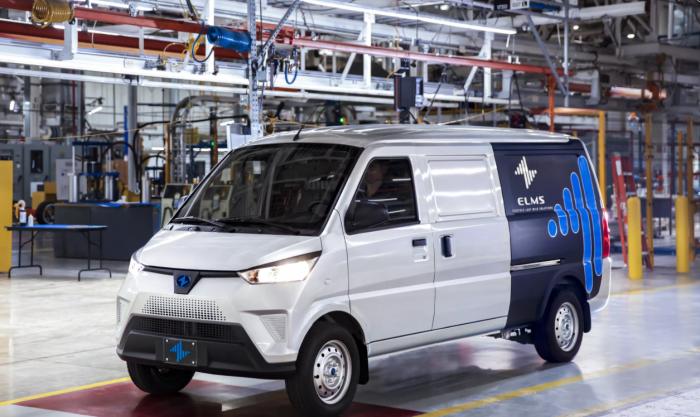According to CNET, Tesla, Rivian, Lucid and Fisker are the electric car makers that have grabbed the headlines. But countless other electric car manufacturers are also working to make battery-powered cars. One of the most important manufacturers is Electric Last Mile Solutions, or ELMS. At CES 2022, the company came out of the shadows – and in the short term, ELMS could become a household name. Jim Taylor, co-founder and CEO of the automaker, told CNET: "I still call us relatively hidden companies. He explained: "We are real, we are not a PPT (demo), nor is it a car that will appear in two years. ”

ELMS is now manufacturing and delivering pure electric vans. Headquartered in Troy, Michigan, ELMS has a manufacturing facility at an old Hummer plant in Mishawaka, Indiana, which was converted to make electric vehicles. Taylor was a former GM executive: he was in charge of the Cadillac and Hummer brands.
In contrast to the two brands, ELMS focuses on providing reliable, affordable commercial vehicles. Taylor said, "Extreme technology is not our game," and rather, "extreme affordability." The company's Urban Delivery van is tailor-made for painters, couriers and other businesses that need a long-lasting work vehicle, so don't expect this transporter to feature Nappa leather, adaptive suspension or ventilated seats.
The Urban Delivery is 186 inches long, about the same size as the Ford Transit Connect. It has a wheelbase of 120 inches and weighs 3133 pounds. Cargo space is 157 cubic feet, and its maximum payload is 2100 pounds. As for performance, the car has a 41 kWh battery pack supplied by CATL, which ELMS estimates will provide 110 miles of range in tests by the U.S. Environmental Protection Agency. An electric motor can output 60 kW of power. The top speed is supposedly 55 miles per hour, but it's more than enough for delivery tasks in the city center.
It is reported that the core part of Urban Delivery is Wuling design from China. Taylor explained that many people accuse them of just importing Chinese vans, but he stressed: "That's what we didn't do." ELMS did start with the body-in-white rolling chassis provided by Wuling because "it has proven to be reliable on the road," but ELMS has made major modifications to them, adding seats, sensors and safety devices, new bumpers and headlights (everything needed to make the vehicle legal on the streets of the United States). ELMS has also installed its own electric powertrain.
But why start with the Wuling design? Taylor explained that the company imported a batch of the most popular commercial vehicles sold in China and compared them. Wuling's mature products are among the best, which is why ELMS chose it as the basis for its first model. Of course, starting with an existing product without having to develop a vehicle from scratch can save a lot of time and costs.
The first urban delivery trucks were handed over to customers in September, but they didn't comply with street regulations. The Urban Delivery Campus Vehicle is intended for use in enclosed environments such as college campuses. Taylor explained that ELMS decided to launch a non-certified product first to address any production or supply issues. But at the same time, engineers are developing a marketable wagon, one that meets all federal standards. Work on the model is complete and the vehicle should start shipping to customers by the end of this month, which means people may soon start to see Urban Delivery quietly appear in the community.
In addition to this lightweight product, ELMS is developing an all-electric chassis car model, which will also be an improved version of a Chinese vehicle. The car, dubbed urban Utility, is expected to go on sale in the near term, possibly early in the second half of 2022. The safety requirements for large Category III trucks like this are far less than those of passenger cars, so the company was able to bring the product to market earlier than other companies.
Elms Urban Delivery starts at around $34,500 and doesn't include any electric vehicle incentives. What makes things interesting is that the existing $7,500 federal tax credit should reduce prices to align with internal combustion engine rivals. They could be a better deal when considering the generally lower cost of electricity and the drastically reduced maintenance costs of electric vehicles. As for usability, Taylor said, "we're only focused on the commercial side," Taylor said. ELMS products will be sold through three carefully selected distributors located in major U.S. markets.
Taylor didn't say specifically about the volume of orders or which companies are interested in its products, but he seems very optimistic about what his team is doing. Urban Delivery, he said, "will make us famous."